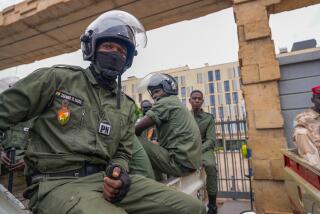Algeria Puts New Limits on Top Islamist
- Share via
CAIRO — Reeling from a recent spate of massacres, Algeria’s government ordered the house arrest Monday of an Islamic leader released from prison just seven weeks ago.
The Interior Ministry announced it will restrict the freedom of Abbasi Madani, spiritual leader of the banned Islamic Salvation Front, on grounds he had become involved in unacceptable political activities.
The decision came just after Madani had issued a public call for a “serious dialogue” with the authorities and offered to launch an appeal to his followers to bring “an immediate end to the [Algerian] blood bath.”
The ministry, in a statement carried by the Algerian Press Service, said: “It is now forbidden for Abbasi Madani to leave his house where he now lives; his guests are limited to members of his family.”
“Any new violation” could lead to Madani’s reimprisonment, the statement warned.
Madani’s release from prison July 15 had been seen as a major conciliatory gesture by the regime toward its Islamic foes. But by putting him under house arrest, the government seems to be shifting back to a harder line in response to a shocking upsurge in violence in recent weeks, including the killing of 350 people by Islamic militants since last Thursday.
The killing Friday of up to 300 civilians in the village of Rais, south of Algiers, was the worst single atrocity of the 5 1/2-year insurgency by Islamic extremists against the military-backed regime of President Liamine Zeroual. The killers left severed heads on doorsteps as a grisly memento of their deeds.
But lesser massacres have been an almost daily occurrence since Madani’s release.
*
Increasingly, the nation’s newspapers and opposition political parties are demanding an explanation from the government of why it has been so ineffectual in stopping the violence.
“If means are available [to protect the countryside] they should be implemented,” the French-language Algiers newspaper Liberte editorialized on Saturday. “If not, then the truth should be told.”
Fighting between government forces and Islamic militias began after authorities intervened to halt the second round of parliamentary elections in January 1992 that Madani’s Islamic Salvation Front was poised to win. As recently as June, government officials insisted they had turned the corner in the battle against the militants and faced only “remnants” of terrorism.
But since parliamentary elections in June--which the government claimed as a major political victory--and Madani’s release from prison in July, the carnage has escalated. Some experts estimate that an average of more than 70 slayings have occurred daily in the last three months.
“Prime Minister Ahmed Ouyahia’s insistence that terrorism has been defeated is so absurd as to be surreal,” wrote Algerian affairs specialist Qusai Saleh Darwish last week in the Saudi newspaper Asharq al Awsat, in an article translated by the Mideast Mirror monitoring service.
Why the upsurge in violence now? “My speculation is that this wave of massacres is a kind of attempt of militant Islamists to show that there will be no solution to this crisis unless they are taken into consideration,” said Egyptian political scientist Gamal Soltan, a specialist on Algeria at the Al Ahram Center for Political and Strategic Studies in Cairo.
*
If the trend continues, and the government cannot protect the rural population, Soltan said, he sees a danger that more and more people will be terrorized into tacitly supporting the extremists.
Cherif Arezki, an editor for the newspaper Al Khabar, said in a telephone interview from Algiers on Monday that he does not see the militants as any stronger than they were before. Were the militants truly growing stronger, he said, they would have attacked police or security forces. “But they are only attacking unarmed civilians in remote areas. . . . All the people are against terrorism,” he insisted.
If nothing else, though, the recent surge in violence has established the limits of the government’s control. Massacres have occurred only miles outside Algiers, in an indication that the military lacks the equipment and manpower to provide round-the-clock protection to communities even a short distance from the capital and other urban areas.
And at present, the outlook for any kind of negotiated solution appears bleak. Soltan pointed out how quickly the government appeared to reject Madani’s suggestion for discussions. From the extremists’ side, there is also little appetite for talk, he said.
“Violence has become a kind of ideology in itself for these people,” said Soltan. “Negotiation and compromise with people who see things from a strict religious perspective of right and wrong is very difficult.”
The latest massacres, meanwhile, have renewed sympathy for ordinary Algerians caught in the middle. “There must be intervention to rescue innocent people from this cycle of murder,” the pan-Arab newspaper Al Quds said Monday. “What is the world waiting for after five years of massacres? Must the entire Algerian people be exterminated?”
More to Read
Sign up for Essential California
The most important California stories and recommendations in your inbox every morning.
You may occasionally receive promotional content from the Los Angeles Times.













